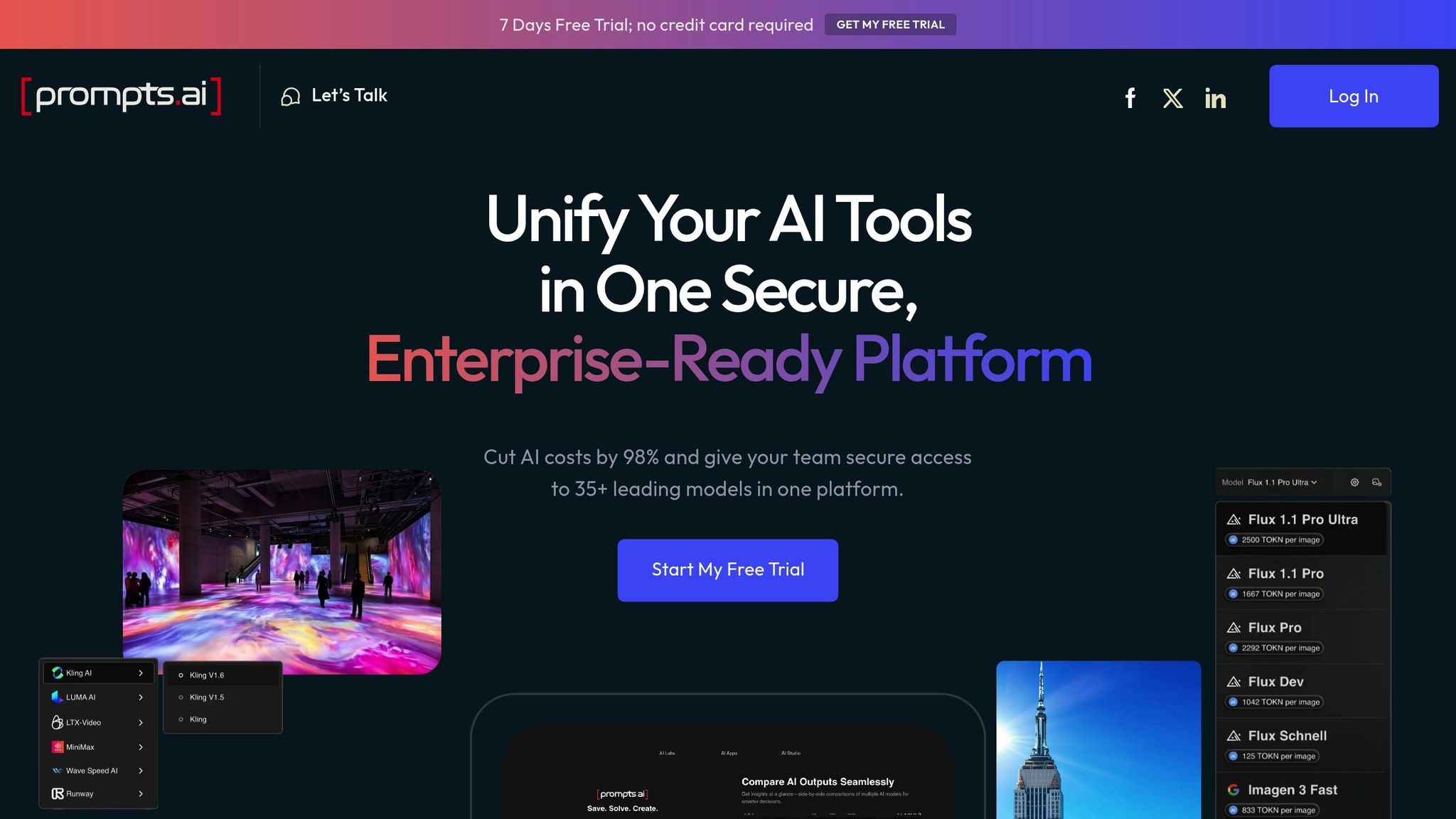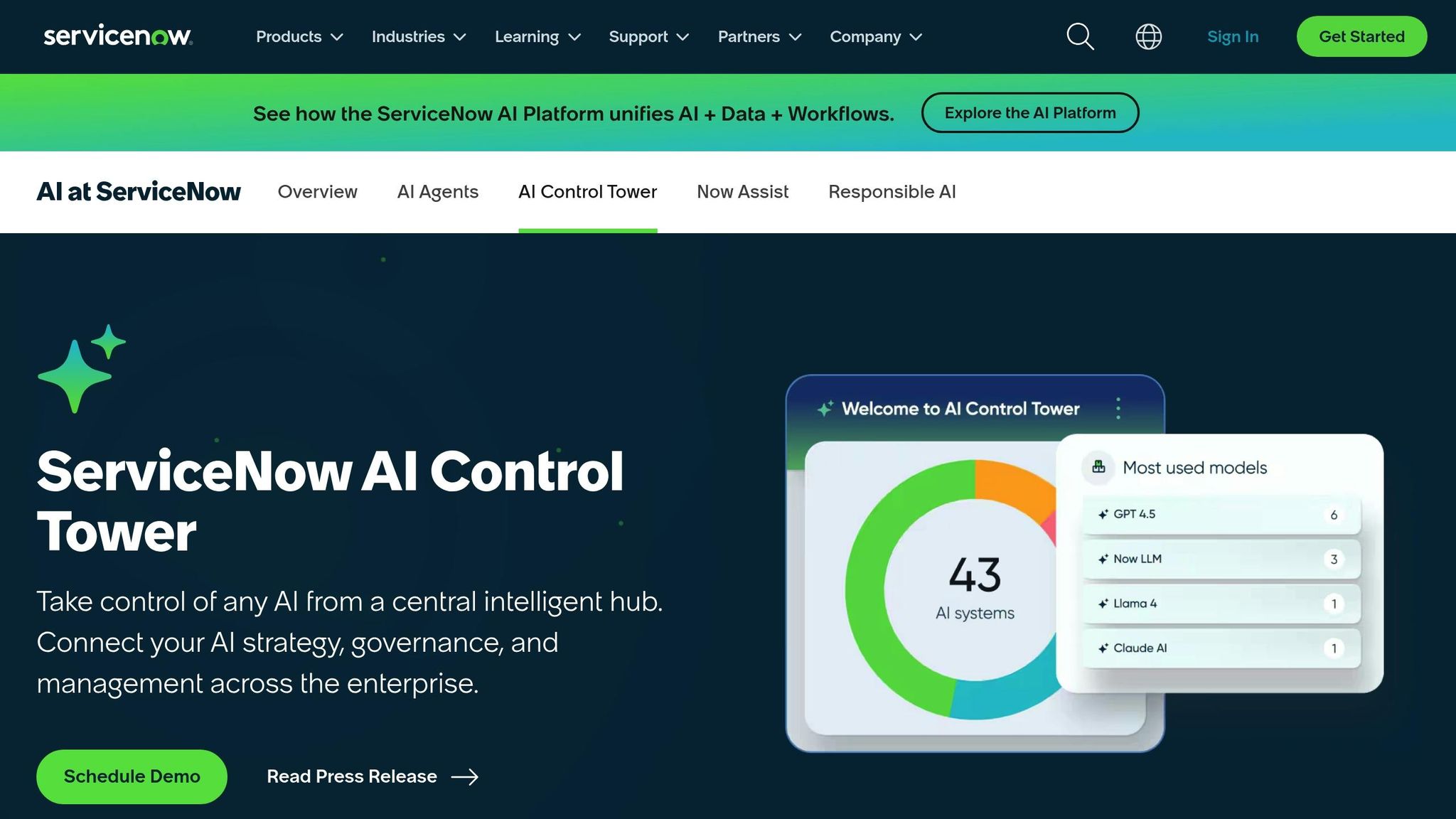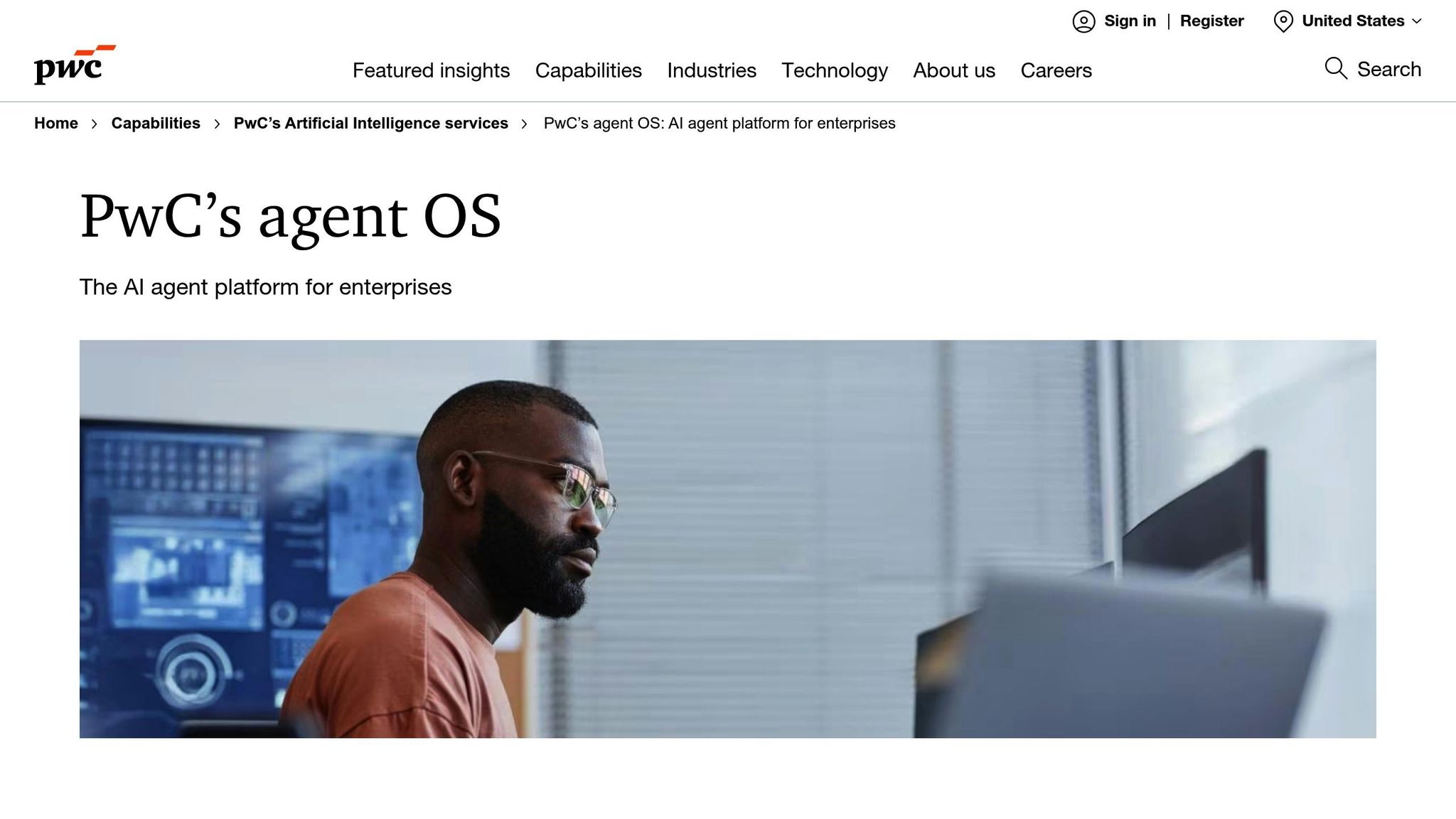
AI Command Centers are transforming how enterprises manage their AI operations. These platforms centralize oversight, optimize costs, and ensure compliance across AI tools and workflows. For organizations running multiple AI agents, a command center can reduce inefficiencies, improve visibility, and enforce governance. Below are three top platforms compared:
| Platform | Key Features | Best For | Limitations |
|---|---|---|---|
| Prompts.ai | Cost savings, pay-as-you-go, multi-model access | Flexible AI use across workflows | Limited large-scale case studies |
| ServiceNow AI Control Tower | Governance, IT integration, analytics | ServiceNow ecosystem users | High costs, slower deployment |
| PwC agent OS | Financial tracking, compliance, quick setup | Regulated industries | Dependency on premium consulting |
These platforms cater to different needs, so businesses should assess their current AI usage, budget, and compliance requirements before choosing.

Prompts.ai is an enterprise platform designed to simplify and manage AI operations by bringing multiple large language models together into one secure system. It tackles a common challenge for businesses: reducing the chaos of scattered AI tools while ensuring proper oversight and cost management for distributed AI tasks.
Prompts.ai prioritizes security and compliance with a robust framework that includes AES-256 encryption, strict access controls, and role-based permissions secured by multi-factor authentication. The platform aligns with key regulations like GDPR and HIPAA, ensuring that all AI-driven workflows are fully traceable and meet data governance standards.
What sets Prompts.ai apart is its use of transparent AI models paired with regular audits. The platform also includes an incident response plan and built-in collaboration tools, which help teams stay efficient while meeting compliance requirements. Beyond regulatory safeguards, the integration of workflow automation enhances operational productivity.
The platform simplifies the process of managing and evaluating prompts, helping businesses achieve goals like cutting costs, speeding up product launches, and improving customer experiences. Detailed performance tracking and cost analysis provide clear insights into how prompts perform and how the system behaves.
Prompts.ai's FinOps layer monitors every token used and optimizes expenses, with the company claiming it can reduce AI software costs by as much as 98%. Its pay-as-you-go TOKN credit system ensures there are no recurring fees, as costs are tied directly to actual usage.
Prompts.ai integrates effortlessly into existing workflows using an API-first design and various integration tools. Its cloud-native infrastructure, powered by technologies like Kubernetes and serverless systems, ensures scalability by automatically adjusting resources to meet changing demands. This setup allows the platform to handle complex tasks, from solving intricate customer problems to processing large datasets and managing multi-step business operations.
Prompts.ai stands out by offering comprehensive onboarding, targeted training, and access to a certified community of prompt engineers. The Prompt Engineer Certification program helps establish best practices and cultivates in-house experts within client organizations.
Additionally, the platform focuses on creating strategic plans and promoting AI understanding across teams. This ensures that every AI initiative aligns with broader business objectives, empowering organizations to get the most out of their AI investments.

The ServiceNow AI Control Tower serves as a centralized hub for monitoring and governing AI activities across an organization. It provides clear insights into how AI is being used while ensuring consistent governance policies across all business units. This structure enables organizations to maintain control and integrate AI effectively across their operations.
At its core, the AI Control Tower focuses on assessing risks and enforcing policies. It allows organizations to establish company-wide rules for AI usage and ensures compliance by monitoring all business units. The platform provides continuous oversight of model deployments, data usage, and potential security risks.
One standout feature is its ability to create audit trails for every AI-related activity. These records help organizations meet regulatory demands and adhere to internal compliance standards.
The platform seamlessly integrates with ServiceNow ITSM, streamlining processes like automated AI issue ticketing, approval workflows for new AI initiatives, and structured change management.
By supporting cross-department collaboration, the Control Tower prevents redundant AI investments and enforces consistent technology standards across the organization. This ensures that departments work in harmony rather than duplicating efforts.
In addition to its governance capabilities, the platform delivers detailed analytics to enhance efficiency. It tracks AI performance by analyzing usage metrics, costs, and ROI. This allows organizations to identify which AI tools are driving the most value and pinpoint underused resources that may need adjustment or replacement.
The analytics engine also evaluates user adoption rates and highlights areas where additional training may be required. This data empowers businesses to scale successful AI projects while discontinuing those that fail to deliver results.
ServiceNow provides expert assistance to tailor governance policies and integrate the platform into existing workflows.
The platform includes ready-made templates for common AI governance scenarios, helping large organizations deploy it more quickly. Beyond setup, ServiceNow offers ongoing support, ensuring that governance strategies evolve alongside the organization's AI initiatives. This approach helps businesses adapt as their AI programs grow and change over time.

In this continuation of our review of enterprise command centers, PwC agent OS emerges as a standout solution, blending financial oversight and compliance controls with advanced AI orchestration. This platform serves as a centralized hub for managing multiple AI providers, allowing businesses to maintain control and visibility while leveraging diverse AI capabilities.
A key strength of PwC agent OS lies in its financial management features, which are designed to optimize costs and enhance transparency. The platform offers cost, carbon, and latency dashboards that turn AI workflows into actionable financial metrics. This enables organizations to track the profitability and efficiency of their AI initiatives with unparalleled accuracy.
The system employs a Policy Bus powered by a Rego-style engine, which evaluates actions against YAML-defined policies. This setup ensures strict financial controls, such as automatically flagging or blocking payments that exceed predefined thresholds, while also allowing human intervention when needed.
Dynamic Sandboxes further enhance financial security by running agents in isolated, containerized environments. These sandboxes enforce soft resource caps and trigger escalations for high-value transactions, such as those exceeding $10,000, ensuring that financial operations remain both secure and efficient.
PwC agent OS goes beyond technical functionality to address compliance and risk at an enterprise level. Its Sub-goal Auditor acts as an independent "watcher" LLM, reviewing each step of an agent's plan and redacting risky tokens to prevent errors, such as incorrect currency values in financial transactions.
For organizations in regulated industries, the platform offers an append-only ledger with blockchain-backed hashes to create an immutable audit trail. This ensures transparency and accountability for all financial and operational decisions.
The platform also includes pre-built process blueprints for critical business functions like Finance & Accounting, Human Capital Management, and Supply Chain Management. These blueprints allow seamless integration of AI into existing workflows while maintaining essential business controls, such as enforcing three-way-match procedures.
PwC agent OS is designed for rapid deployment, delivering results within 30 days - a timeline that's ten times faster than traditional methods. Its reusable modules and workflows enable organizations to scale operations efficiently while keeping costs under control.
Automation capabilities are another highlight, with the platform reducing manual effort by as much as 95% for end-to-end workflows. Real-world implementations have demonstrated measurable gains, such as 25% shorter call-center times and 94% reductions in compliance review workloads, showcasing the platform's ability to streamline operations and improve productivity.
What sets PwC agent OS apart is its integration of professional services expertise. PwC has deployed over 250 AI agents within its own operations, leveraging this experience to guide client implementations effectively.
The platform seamlessly connects with enterprise systems like Workday, enabling features such as "budget oversight agents" to align financial processes with organizational goals. It also supports orchestration across creative, testing, and analytics functions, ensuring a comprehensive approach to enterprise AI.
With 88% of executives planning to increase AI budgets in the coming year, PwC agent OS positions itself as an essential tool for businesses looking to expand their AI capabilities while maintaining strict financial and operational controls. This combination of advanced technology and professional insight ensures organizations can scale confidently and responsibly.
When choosing the right platform, balancing compliance needs with operational efficiency is crucial. Below is a comparison of the strengths and weaknesses of three platforms - Prompts.ai, ServiceNow AI Control Tower, and PwC agent OS - followed by a discussion of their broader strategic implications.
| Platform | Key Advantages | Primary Limitations |
|---|---|---|
| Prompts.ai | • Cost efficiency: Up to 98% reduction in AI software costs • Rapid deployment: Implementation within minutes • Model flexibility: Access to over 35 large language models through a single interface • Pay-as-you-go: TOKN credits eliminate recurring subscription fees |
• Newer platform with a growing feature set • Limited large-scale enterprise case studies so far • Complex legacy system integrations may require custom development |
| ServiceNow AI Control Tower | • Seamless integration within the ServiceNow ecosystem • Optimized workflow automation for IT service management • Proven track record with Fortune 500 companies • Extensive support infrastructure and professional services |
• High initial investment in the ServiceNow platform • Escalating licensing and operational costs • Limited flexibility outside of ServiceNow's AI framework • Longer deployment and configuration timelines |
| PwC agent OS | • Focus on cost control and compliance oversight • Leverages PwC’s expertise in agent deployment • Quick implementation and automation for operational efficiency |
• Dependence on PwC consulting for ongoing optimization • Higher costs due to premium consulting services • Pre-built solutions may require customization for unique needs • Risk of vendor lock-in due to proprietary methodologies |
Prompts.ai stands out for its rapid deployment and low operational overhead, offering a straightforward solution for managing AI workflows without the complexity of traditional infrastructure. Its pay-as-you-go model provides predictable cost control, making it ideal for organizations looking to scale usage efficiently across multiple AI models.
For enterprises heavily invested in the ServiceNow ecosystem, ServiceNow AI Control Tower offers the advantage of deep integration and robust workflow automation. However, its benefits often come with higher costs, both upfront and ongoing, and achieving full functionality may require a significant time commitment for deployment and maintenance.
PwC agent OS appeals to industries that prioritize financial oversight and compliance. While its rapid implementation and automation capabilities are attractive, the reliance on PwC consulting for optimization and the associated costs may pose challenges, especially for smaller-scale projects.
From a financial perspective, Prompts.ai offers a clear edge with its flexible pay-as-you-go model, eliminating recurring subscription fees and optimizing usage across various AI models. In contrast, ServiceNow demands a substantial upfront investment coupled with recurring licensing fees, which can lead to higher long-term costs. PwC agent OS emphasizes ROI through automation but may see gains offset by consulting fees, particularly for smaller implementations.
In terms of scalability, Prompts.ai's model-agnostic approach ensures adaptability to emerging AI technologies without requiring platform migration. Its unified interface supports a wide range of models, from GPT-4 to specialized options, offering flexibility as AI continues to evolve. On the other hand, ServiceNow's scalability is more limited by its architecture, especially when AI applications extend beyond traditional IT workflows. PwC agent OS may require significant customization for broader AI use cases, which could limit its scalability.
Each platform has its unique strengths. Prompts.ai excels in speed and cost efficiency, making it a practical choice for organizations seeking quick results with minimal investment. ServiceNow AI Control Tower is best suited for businesses already embedded in the ServiceNow ecosystem, offering seamless integration and workflow optimization. Meanwhile, PwC agent OS is a strong contender for industries with complex compliance requirements, providing a blend of automation and professional guidance tailored to financial oversight.
Building on the earlier discussion of centralized AI command centers, this section highlights key considerations for enterprise decision-makers. Before selecting a platform, it’s essential to evaluate your infrastructure, budget, and strategic goals. These points provide a foundation for examining the distinct advantages each platform brings to the table.
Prompts.ai delivers an affordable and fast deployment option for organizations that want to avoid major infrastructure changes. With a unified interface supporting over 35 language models, it operates on a pay-as-you-go model using TOKN credits, ensuring costs align directly with usage. The platform is designed to cut AI software expenses by up to 98% while maintaining strong security and operational efficiency.
ServiceNow AI Control Tower is tailored for enterprises already embedded in the ServiceNow ecosystem. Its seamless integration enhances IT service management, HR operations, and customer support workflows. This platform shines in high-volume environments where automated case management can significantly reduce time and expenses. However, its licensing model requires careful planning, especially for large-scale deployments.
For US-based enterprises, a thorough evaluation of the existing technology stack is crucial. Companies already invested in ServiceNow may benefit from extending their current platform, while those aiming to consolidate various AI tools could find Prompts.ai’s model-agnostic design and transparent, usage-based pricing more appealing.
The timeline for deployment is another critical factor. Prompts.ai offers near-instant implementation for urgent needs, whereas ServiceNow requires a more involved setup process. While this longer configuration period supports deeper workflow integration, it may not suit organizations with immediate demands.
Prompts.ai guarantees compliance with key regulations like GDPR and HIPAA by implementing rigorous data security protocols and following strict legal standards. This includes leveraging Data Processing Addenda (DPA) and providing automated compliance reports to meet regulatory demands effectively.
The platform also emphasizes enterprise-level security to protect sensitive data, ensuring all processes meet top-tier privacy and accountability benchmarks.
The pay-as-you-go TOKN credit system in Prompts.ai is built to help you manage costs efficiently and with greater flexibility. Unlike traditional subscription models, you only pay for the tokens you use, giving you full control over your spending without unnecessary charges.
With real-time usage tracking, you can keep a close eye on expenses and prevent overspending. This approach can cut operational costs by as much as 98%, ensuring your budget is optimized while still meeting your needs.
Prompts.ai simplifies enterprise AI workflows by integrating with over 35 language models and providing centralized tools to manage them all in one place. Its scalable design turns chaotic, unstructured experimentation into organized, repeatable processes. This setup not only boosts team collaboration but also ensures secure access with role-based permissions and automation.
Key features like the pay-as-you-go TOKN system and LoRA training controls help cut operational costs and reduce overhead. These tools make it easier to deploy AI solutions quickly while keeping management efficient. With Prompts.ai, enterprises can expand their AI efforts without adding unnecessary complexity or expenses.


